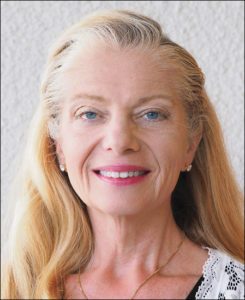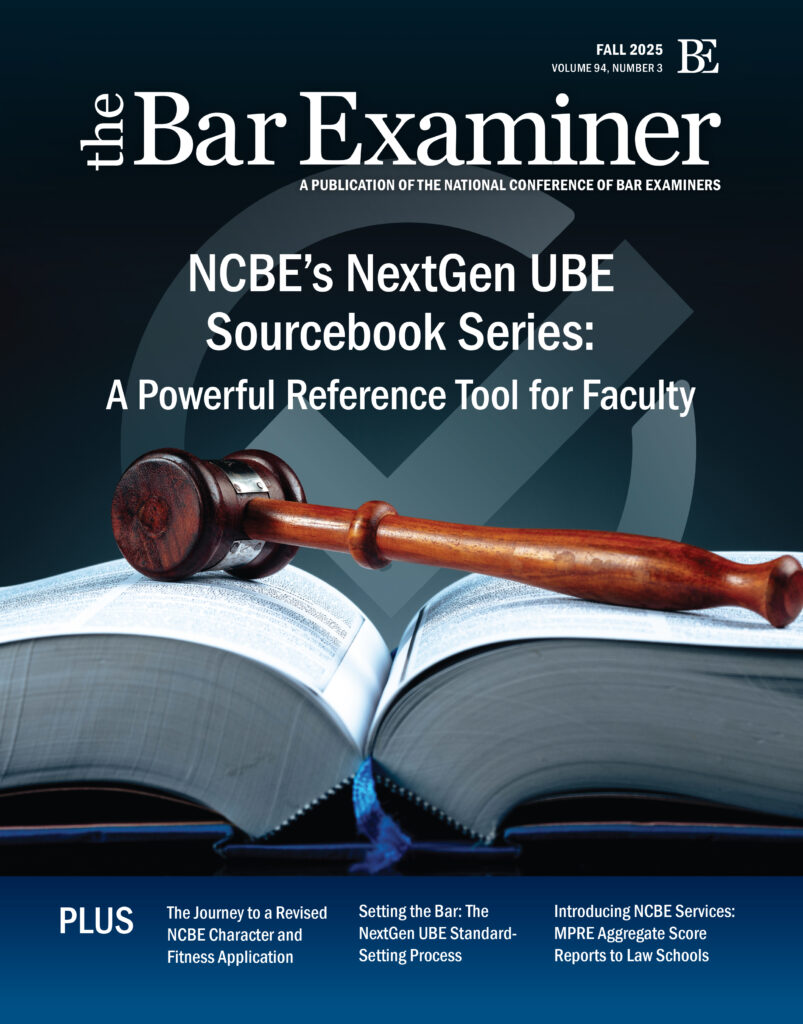This article originally appeared in The Bar Examiner print edition, Winter 2019-2020 (Vol. 88, No. 4), pp 1–2.
By Hon. Cynthia L. Martin

On Being Imaginative
imaginative: having or showing creativity or inventiveness.
(Webster’s Third New International Dictionary, Merriam-Webster, 1993)
Albert Einstein once said that imagination is more important than knowledge. He had a point. Knowledge permits us to grasp the world as we know it. Imagination, on the other hand, envisions something that does not yet exist, something that has not yet been seen. Imagination permits us to change the world as we know it.
The difference between knowledge and imagination is simple enough to grasp. Yet we tend on some level to associate imagination with dreamers who might possibly be a bit out of touch with reality. How many of us were accused in our childhood, or have children who have been accused, of possessing an “overly active imagination,” a label rarely ascribed without a hint of criticism and concern? Children are born imaginative, free to express their uniqueness, unencumbered by realities they have yet to grasp or understand. They learn over time, however, in the process of becoming well-meaning adults, to forsake their imaginations and redirect their naturally inquisitive and imaginative minds to mastery of the here and now in lieu of the “what could be.”
A strong case can be made for recognizing that imagination is an essential attribute that should be embraced, nurtured, and encouraged in individuals and in institutions. And if imagination is at the root of breakthroughs and innovations, then stagnation (defined as something that stays the same and does not grow or develop) is necessarily at the root of institutional starvation, even death. Remember the VCR? Kodak film?
Walt Disney understood this decades ago when he created the Disney Imagineers, a team of individuals responsible for designing and building Disney theme parks. “Imagineer” is a portmanteau word (akin to the word “brunch”)—a word whose form and meaning are derived from combining two words, in this case, imagination and engineer. Walt Disney’s vision in creating Imagineers recognized that Disney’s successful longevity depended on a combination of imagination and engineering. Disney Imagineers are thus charged with designing and building theme parks using the technique of “blue-sky speculation,” where ideas, concepts, and possibilities are generated in an unencumbered fashion without regard, initially, to any potential limitations, such as technological or budgetary constraints.
NCBE has a long history of “imagineering.” The creation of new test products since the launch of the Multistate Bar Examination in 1972—including the Multistate Professional Responsibility Examination in 1980, the Multistate Essay Examination in 1988, and the Multistate Performance Test in 1997—are examples of imaginative test concepts that were engineered to reality by the combined work of talented subject-matter experts, test-development personnel, and psychometricians.
The imaginative notion of score portability, whereby jurisdiction bar admitting authorities would agree to afford full faith and credit to bar exam scores achieved in a different jurisdiction, led to the Uniform Bar Examination, which has exploded from a novel concept to reality in 36 jurisdictions in just over eight years.
NCBE’s Testing Task Force—appointed in January 2018 to undertake a three-year study to ensure that the bar examination continues to test the knowledge, skills, and abilities required for competent entry-level legal practice in a changing profession—is a poster child for imaginative, blue-sky thinking. The Task Force announced that it would approach its study in an empirical and unencumbered fashion—without regard to the content, format, timing, or delivery method of the current bar examination, and without any preconceived notions as to whether competencies revealed by the study could or should be tested on a bar examination. The Task Force’s research study has proceeded exactly along that path, with the genuine (and itself imaginative) objective of forging cooperative working relationships with key stakeholders who also play a role in preparing newly licensed lawyers for practice. When the Task Force’s study is complete, program redesign will no doubt be recommended, and the engineering component of “imagineering” will begin.
There are many other examples. The Conference’s BarNow™ initiative represents a fresh and imaginative look at how NCBE can benefit applicants with user-friendly, digitally accessible, affordable bar exam study aids. Administration of the MPRE is in the last stages of being converted entirely to computer-based testing, an undertaking steeped in imaginative thinking—and one that is far more complicated than simply moving questions and answers from pencil-and-paper format to a computer screen. The evolution of this very publication, NCBE’s content-rich quarterly Bar Examiner magazine, to a digital format now allows readers to search a vast archive of articles by topic of interest, making available a wealth of important content to the bar admissions and legal education communities.
It can take years for a bold new idea or concept to turn into a finished product. And sometimes, capital and other resources invested in an imaginative idea may never bear fruit. But complacency has never been, and will never be, an option for NCBE. Our work at NCBE is formulated around the essential question born of an imaginative mindset: “Now what?” NCBE’s answer to that question will always be informed by innovations that enhance and improve the high-quality products, services, and outreach initiatives that we already offer to jurisdictions, applicants, and affiliate organizations.
Without imagination, there can be no innovation. Without imagination, stagnation can be mistaken for stability. So, we welcome your feedback and your ideas, including those that directly challenge what we do or how we do it. Paraphrasing Henry David Thoreau, the bar admissions world is but a canvas to our imagination. You can be assured that NCBE’s sincere and genuine belief in the value of what we are doing, married with imagination and a willingness to commit essential resources to innovative ideas, will take us where our constituencies need us to be.
Sincerely,
![]()
Hon. Cynthia L. Martin
Contact us to request a pdf file of the original article as it appeared in the print edition.







